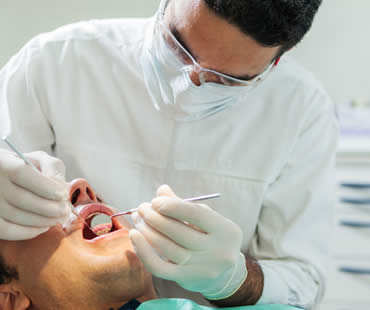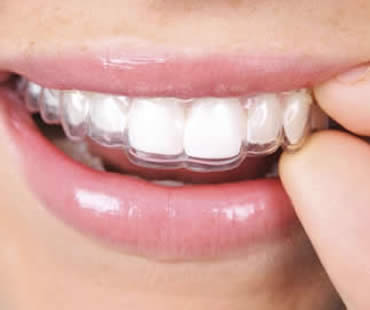
If you have been living with a mouth full of badly decayed teeth, infected gums or painful tooth infections, your dentist may have talked to you about how dentures can transform your smile. While no one wants to extract all of his or her teeth and have no remaining natural teeth, if your teeth have been a source of pain and embarrassment to you for years, having a beautiful new set of dentures could sincerely change your life.
Dentures are very natural-appearing replacements for an entire mouth of missing natural teeth and gum tissue. Dentures are removable and can be cleaned thoroughly each day, unlike examples like dental crowns or dental bridges that are permanently affixed to your mouth.
Badly decayed teeth and other oral issues can lead to chronic pain that spreads from the mouth to other areas of the face, head and neck. This pain can disrupt your life, leaving you irritable and moody, causing you to isolate yourself. Pain medications can lead you to feel groggy or off-balance, affecting your interactions with others in a negative manner. Once those teeth are removed and any underlying infection is addressed, you will be shocked at how much better you feel. The absence of this once-ongoing pain will feel as though you are free of a great burden you hadn’t realized you were carrying.
Years of poor oral health might have left you unwilling to smile broadly, or to be uncomfortable in public speaking, laughing or eating and drinking. You may avoid friends and family and you might choose not to form new relationships easily. Once your damaged teeth have been removed and you have been fitted for dentures, you will be amazed at the “new you.” The bright, perfect white smile that greets you in the mirror may look like a movie star’s smile, but in fact, it’s your smile. With your new dentures, you can feel confident as you move through life.
If you need a dentist in Meriden contact us today

Using mouthwash is not a replacement for brushing and flossing, but instead is an addition to your oral care routine that can help you maintain healthy teeth and gums. If you’ve visited the mouthwash aisle at your local drugstore lately, you’ve seen that there is a giant selection of brands and types to choose from. It can be a bit overwhelming if you don’t know what purpose each one serves. Here is a description of the most common types of mouthwashes to help you choose.
Antiseptic
The goal of antiseptic mouthwash is to kill germs and bacteria in your mouth. It can also combat gum disease and persistent bad breath. Most dentists recommend that you discuss using antiseptic mouthwash with them before selecting this type, because they can help you decide if it’s needed for you. It can impact your sense of taste and can stain your teeth, so you want to be sure it’s helpful for you before using it.
Fluoride
The most common kind of mouthwash is fluoride, which utilizes the natural abilities of this mineral to strengthen your tooth enamel and prevent tooth decay and cavities.
Cosmetic
Designed to disguise bad breath, or halitosis, cosmetic mouthwash does not offer protection from problems like tooth decay. It can help keep your teeth clean and help rinse away food particles, but it is mainly for freshening your breath.
Combination
Mouthwash that combines purposes of the product is called combination mouthwash. It is meant to prevent tooth decay, maintain your oral health, and freshen your breath.
Prescription
Sometimes a prescription mouthwash is warranted for patients with gum disease or other types of decay. See your dentist to find out it this type of mouthwash would benefit you.
If you live in the Meriden area and you need a general dentist, contact us today.

Porcelain dental veneers are among the most popular for making over your smile. Dental veneers can achieve dramatic and stunning results, not only in the aesthetic appearance of your smile, but also in the way you feel about yourself. Years of self-conscious behavior related to smile insecurities will begin to fall away, leaving you smiling, talking and eating in public with confidence.
Dental veneers are typically used on the most visible of your teeth, the front teeth. A very small amount of the natural tooth is ground away to make room for the veneers – so they will not appear “puffy.” A dental lab will then fabricate custom veneers from molds, using special techniques to craft the most realistic veneers in the desired tooth shade. Once these veneers are placed, they are designed to look as though they are natural, beautiful, white teeth, resulting in your best, most vibrant and confident smile.
Porcelain veneers are a relatively simple and risk-free way to correct chipped, gapped, crooked or stained teeth. Short teeth can be lengthened, and “gummy” smiles can be corrected. Some patients have suffered for years in embarrassment or discomfort with dental issues they thought would require major dental work to correct. Many times, these issues can be corrected quickly and easily with porcelain dental veneers.
If you are considering a smile makeover, it’s important to look around. Because cosmetic dentistry isn’t a legally separate specialty of dentistry, many dentists call themselves cosmetic dentists without fully appreciating the level of artistry and passion for beauty necessary to create a beautiful new smile design.
Ask any dentist for photographs of before and after patient results done personally by that dentist. Talk to your friends to see if someone has a personal recommendation. You might be surprised at how many people you think just have gorgeous natural smiles actually have had a smile makeover and now utilize dental veneers.
Don’t wait to start experiencing the benefits of dental veneers and a smile makeover. Talk to your cosmetic dentist today to see what options are available to you to meet your own smile goals.
Schedule your appointment at our Meriden dental office

Many children aren’t excited about seeing the dentist, either as a result of comments others have made or the idea of an unknown experience. Dental visits are necessary for everyone though, beginning around the child’s first birthday. Here are some basics to know about your child’s dental care.
What happens at the first appointment?:
When your child sees the dentist for the first time, the dentist will look for tooth decay and determine your child’s risk for it. You will be shown how to properly clean your child’s teeth. Also, your dentist will explain the risks of habits that may affect your child’s teeth, such as thumb sucking or sugary drinks.
How often should my child see the dentist?:
You should continue to take your child to visit the dentist every six months, or in some cases more often if your child’s risks are high for tooth decay. Regular checkups can reduce your child’s risk for cavities because plaque will be removed and fluoride will be applied to strengthen the teeth. Also, potential dental issues may be caught early to avoid problems in the future.
What if further treatment is recommended?:
Even though your child might not have permanent teeth yet, dental work may be required on baby teeth too. Cavities can be painful and should be filled. Also, healthy baby teeth help your child properly chew, speak, and develop permanent teeth.
How can I help my child feel more comfortable?:
It is important to help your child’s dentist visits go smoothly so that lifelong habits of regular checkups without fear can be developed. You might consider choosing a pediatric dentist who specializes in children’s oral health and is trained to help kids through the dental visit. Discuss an upcoming dentist appointment with your child, and explain what to expect during the visit. If possible, take your child by the dentist’s office before your first appointment to see what it’s like. During the checkup, remain near your child to increase feelings of security and comfort.
Our dental office is located in Meriden

It’s easy to put off a trip to the dentist if you’re not experiencing any pain or noticeable issues. Maybe it’s inconvenient in your busy schedule, maybe you don’t want to spend the money, or maybe you experience anxiety about dental visits. None of these are good enough reasons to forego proper dental care so that you ensure a healthy mouth and attractive smile.
Having regular checkups with your general dentist is important for a variety of reasons. Probably the most beneficial reason is to catch problems early, before they have time to become serious and negatively impact your oral health. Cavities and gum disease are both examples of issues that can wreak havoc in your mouth if left untreated, but if handled quickly they may disappear with as little as a fluoride treatment or change in your hygiene routine. Avoiding treatments like fillings, crowns, or root canals – not to mention the associated costs to your wallet and your schedule – are great reasons to see your dentist every six months!
Another benefit of regular checkups is a brighter, more beautiful smile. Even the best dental hygiene at home can’t reach every bit of plaque or tartar that accumulates on your teeth. Professional cleanings eliminate buildup to give you a more appealing smile, as well as removing harmful and stinky bacteria from your mouth.
Your overall health also reaps the rewards of consistent dental care. Oral problems can impact your general health through things like introducing dangerous bacteria into your body that can spread and cause various health risks. Also, your dentist may notice signs of health issues you might not realize, such as cancers or diseases or nutritional deficiencies.
Make your smile a priority and visit your general dentist regularly. Don’t let excuses get in the way of receiving the rewards dentistry has to offer.
We look forward to seeing you in our Meriden dental office

The innovative approach to improving smiles through Invisalign has paved the way for beautiful smiles for people of all ages. Not just for children and teenagers, Invisalign appeals to adults all the way through to retirement ages. It’s never too late to transform your smile and regain your self-esteem when you have the option of Invisalign.
What types of problems does Invisalign address? In addition to simply straightening the teeth to achieve a more perfect smile, dental problems like gaps, overcrowding, overbites, underbites, open bites and cross bites can all be improved.
The process involves wearing customized invisible plastic aligners over your teeth. New aligner trays are provided every few weeks during treatment as your teeth gently move to their improved positions. The aligners are removable for easy dental hygiene, since normal brushing and flossing are possible instead of dealing with cumbersome wires and brackets. The clear plastic trays are nearly invisible in your smile, hugging your teeth securely allowing for no embarrassing slips or speech impacts.
Invisalign is possible for just about anyone with permanent teeth and healthy gums. Older patients are often at higher risk for gum issues, so correcting crooked teeth or overlaps is especially beneficial to help those patients avoid gum problems related to gaps or inability to clean teeth properly. Correcting misalignments can also prevent jaw or joint pain in the mouth, head, and neck area.
Patients over the age of 50 are seeking orthodontic treatment more than ever. As they age, many people want to avoid dentures when possible and Invisalign can provide a great option for making smiles look more appealing while also improving oral health. A beautiful smile can also improve your outlook on life, making you look and feel younger. An attractive smile positively impacts your overall attitude and appearance, and it’s possible with the help of Invisalign.
We look forward to seeing you in our Meriden dental office














